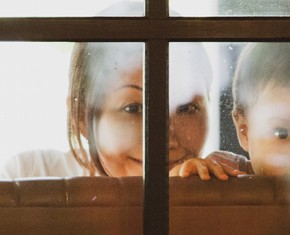The views expressed in our content reflect individual perspectives and do not represent the authoritative views of the Baha'i Faith.
How can religion enhance the conscious evolution of culture?
If tradition cannot reliably guide our thoughts and actions in an era of accelerated change, then we must learn how to deliberately influence the cultural patterns that connect us with one another: how we talk, act, work, relax, eat, drink, pray, love, etc. Religion plays a key role in any effort to direct cultural change. That’s because when it’s done right religion shows how everything fits together. Then it transforms that knowledge into inspiration for action:
The Word of God may be likened unto a sapling, whose roots have been implanted in the hearts of men. It is incumbent upon you to foster its growth through the living waters of wisdom, of sanctified and holy words, so that its root may become firmly fixed and its branches may spread out as high as the heavens and beyond. – Baha’u’llah, Tablets of Baha’u’llah, pp. 93-94.
In a small way, I’ve personally observed how the community life fostered by the Baha’i Faith can set in motion a process of cultural change. I saw it in university, when I first came into contact with Baha’is.
In my first year of university, I was Catholic; more Catholic than the vast majority of Catholics, which made me feel alone. I was into the sacraments, the theology, the Bible, the saints, the rosary, all the glorious un-modernness of the whole thing. But an American college campus is not always a good place to be a devout Catholic. I felt isolated.

So I was quite enthusiastic when someone on my hall invited me to a study and discussion group that she and a couple of other Baha’is hosted. It was a study circle based around the first course of the Ruhi Institute, called Reflections on the Life of the Spirit. Its format and atmosphere would be familiar to people all over the world who have participated in this kind of study circle before. It took place in a dorm kitchen, where there were lots of people going in and out. There were a few of us who would be there for the whole time. But other folks always drifted in, joining in on the conversation for a few minutes, and then going back to whatever they were doing.
One of the things that really attracted me about the study circle was it’s wonderful balance. It was both casual and focused. The book had well-defined points for us to grasp. But it also facilitated dialogue and open-mindedness. It was action-oriented, but it didn’t presume there was only one way to apply certain spiritual principles. The study circle also had fresh baked cookies.
On a different night, the core study circle participants would get together to share Baha’i prayers. We’d pray together for about an hour in a quiet location, then go to a coffee shop for some uplifting conversation. I was really impressed that the Baha’is I met actually maintained a state of prayer for a straight hour. In my thirteen years of Catholic schools, this was something I experienced only very rarely. The fact that a few university students got together on a weeknight to do this of their own accord really impressed me.
My initial experience participating in the Baha’i pattern of community life taught me a few lessons about the conscious evolution of culture.
One important thing to know: the atmosphere of spiritual striving that we nurtured in those spaces was an evident departure from the pattern of life that surrounded us. If we had passively accepted the culture of the wider community we would have never enjoyed the opportunities for spiritual growth our hub of activity afforded. Before it had taken shape, each of us was mired in our own way in things that did not satisfy our spiritual aspirations. By setting in motion new parts of our weekly routine, we created a point of strength to counterbalance the surrounding culture. Before long, our study circle, devotional gathering, and conversations over coffee started to influence the way other people talked, thought, and acted—and did I mention those cookies?
Back then, there were four of us in that little study circle. But these same practices for building spiritual community, along with other activities we weren’t doing then, have been established in other places by dozens, hundreds, sometimes even thousands of people. For the sake of being concrete, I’d like to share an excerpt from a message of the Universal House of Justice, the global governing body of the Baha’i Faith:
Where this approach has advanced for some years in a neighbourhood or village and the friends have sustained their focus, remarkable results are becoming gradually but unmistakably evident. Youth are empowered to take responsibility for the development of those around them younger than themselves. Older generations welcome the contribution of the youth to meaningful discussions about the affairs of the whole community. For young and old alike, the discipline cultivated through the community’s educational process builds capacity for consultation, and new spaces emerge for purposeful conversation. –The Universal House of Justice, April 2013.
The influence of these kinds of grassroots, community-based activities affects everyone who comes into contact with them:
The very spirit of the place is affected. A devotional attitude takes shape within a broad sweep of the population. Expressions of the equality of men and women become more pronounced. The education of children, both boys and girls, commands greater attention. The character of relationships within families—moulded by assumptions centuries old—alters perceptibly. A sense of duty towards one’s immediate community and physical environment becomes prevalent. Even the scourge of prejudice, which casts its baleful shadow on every society, begins to yield to the compelling force of unity. In short, the community-building work in which the friends are engaged influences aspects of culture. – Ibid.
Through it all, the people who take part in these activities talk and think about what they’re doing. The cultural changes they’re bringing about are deliberate, pre-meditated, and informed by a spiritual framework for individual and collective well-being.
Like a flower that blooms from the mud, these things give me joy and inspire me with awe—and after all, when you really think about it, isn’t that even better than cookies?
















Comments
Sign in or create an account
Continue with Googleor